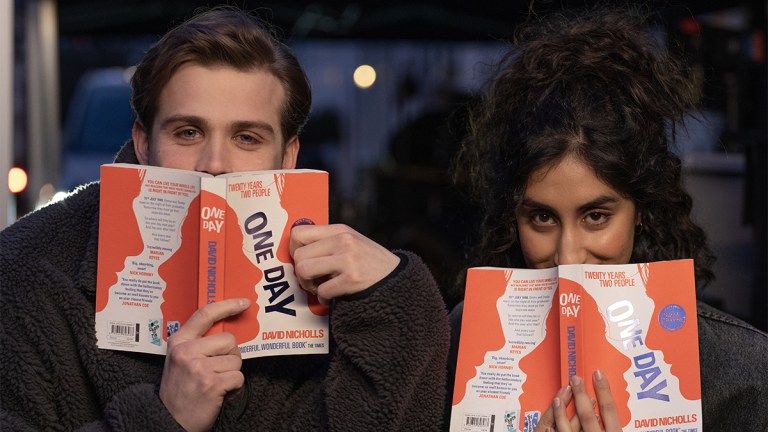One Day: Are Emma and Dexter Based on Real People?
What inspired the lead characters in Netflix’s new romantic series?

‘Is it autobiographical?’ is usually a question that female novelists can’t escape, but when David Nicholls published One Day in 2009, it also plagued him. Perhaps writing in the romantic genre encouraged interviewers to grant Nicholls honorary-woman status? Lucky him.
One Day is the story of Emma Morley and Dexter Mayhew, whose lives we dip into on the same date each year for a couple of decades. They first meet as students at their Edinburgh University graduation ball in 1988, after which their lives weave in and out of each other’s all the way into their mid-30s. The book was a word-of-mouth hit that was made into a very middling film in 2011, and has since been adapted into a terrific 14-part Netflix series starring This is Going to Hurt’s Ambika Mod and The White Lotus’ Leo Woodall.
Because Emma and Dexter become mildly public figures in the story – him as a notorious 1990s TV presenter and her as a successful Young Adult novelist – it’s easy to map various aspects of their fictional lives onto those of real people. What does author David Nicholls have to say on the matter?
Emma Morley
Speaking to a book blog in 2010, Nicholls explained that though One Day is “certainly not an autobiographical book”, there is a degree of personal experience on its pages, “both [his] own and that of friends.”
In 2011, Nicholls told The Guardian:
“In Emma, there are bits of me, and my friends, and bits of fictional characters, too: Shirley MacLaine in The Apartment, Katharine Hepburn, Beatrice in Much Ado, a bit of Annie Hall… characters I love. I loved writing her. I found that attitude to life – the combination of moral seriousness and a kind of wryness – so beguiling.”
Like Emma and Dex, Nicholls graduated in 1988, but from Bristol University (the setting for his first novel Starter for Ten) and not from Edinburgh. Like Emma, Nicholls studied English and Drama, and initially pursued a career in acting that, as he tells it, led to more work as a waiter than it did star roles. In the Nineties, said Nicholls:
“I was an actor, which is another way of saying that I was unemployed. Like Emma, I felt so comfortable and happy at college in the Eighties that the noise and political chaos and uncertainty of the Nineties frightened me a little. Certainly I didn’t spend it at nightclubs and wild parties, like Dexter. I played a lot of small parts in bad plays, and worked in a lot of restaurants, and read and worried about money. What I didn’t do was write – not until 1997. After that things got a little better.”
Unlike Emma, Nicholls didn’t go into teaching but studied acting in New York after leaving university, and became a screenwriter before becoming a novelist. 1997 was a pivotal year for both his real-life and Emma’s fictional careers as novelists, and Nicholls’ own experiences clearly informed Emma’s path as a writer. Aspects of Nicholls’ own life immediately post-university overlapped with those of his character:
“I had a much more Emma-ish time – terrible jobs, a lot of anxiety and self-pity and staying in – and some of that went into her character. Unfortunately I lack Emma’s integrity and wit, and there’s no single, real-life Em. She’s an amalgam – of me, of my female friends, of characters from fiction and film.”
Dexter Mayhew
What about Dexter, the handsome, troubled playboy whose late-night TV career dwindles after early success?
“A lot of my male friends had quite a wild, hedonistic time in London in the Nineties, and that’s gone into Dexter’s character,” Nicholls told the Midlife at the Oasis book blog in 2010.
Speaking to The Guardian in 2011, he expanded: “When I was an actor, I worked with lots of men who had a bit of success early on, who were very good looking, who suddenly made a bit of money and who felt no embarrassment – and nor should they have done – about having a good time. I think there are probably bits of them in Dexter.”
It doesn’t take a great deal of searching to find real figures who share aspects of Dexter’s early TV career. There could be said to be overlap between Dex and Nineties TV presenters including GamesMaster‘s Dominik Diamond (who studied Drama at Bristol University along with David Walliams and Simon Pegg a couple of years after David Nicholls graduated), The Word‘s Terry Christian, and TFI Friday‘s Chris Evans.
Evans, who has since gone on to radio stardom, was known for dating his co-presenters (or alternatively, for hiring his girlfriends) on late-night Friday night post-pub TV Don’t Forget Your Toothbrush, just as Dexter does with his co-presenter Suki Meadows in One Day. Dominik Diamond presented a videogaming show like Dexter, and then became a newspaper columnist for The Daily Star. Terry Christian co-hosted a late-night TV show criticised for segments designed to humiliate members of the public, was also on the receiving end of headlines similar to Dexter’s “Is this the most odious man on television?”.
Diamond, Christian and Evans however, don’t share Dexter’s privileged background, so none can rightly be said to have been a straightforward inspiration. The Nineties though, hardly lacked for middle-class men dropping their ts and aitches to affect a patronisingly ‘street’ accent, as Dexter does presenting his fictional TV show. BBC Radio DJ Tim Westwood (currently under legal investigation for allegations of sexual assault), is famous for having done so despite being the private school-educated son of the Bishop of Peterborough. Blur singer Damon Albarn was one of several celebrities criticised for adopting a “Mockney” accent in the Nineties despite their middle-class backgrounds.
In conclusion: the characters of Em and Dex are patchworks, amalgams of various cultural influences and personal inspirations.
One Day is streaming now on Netflix.
